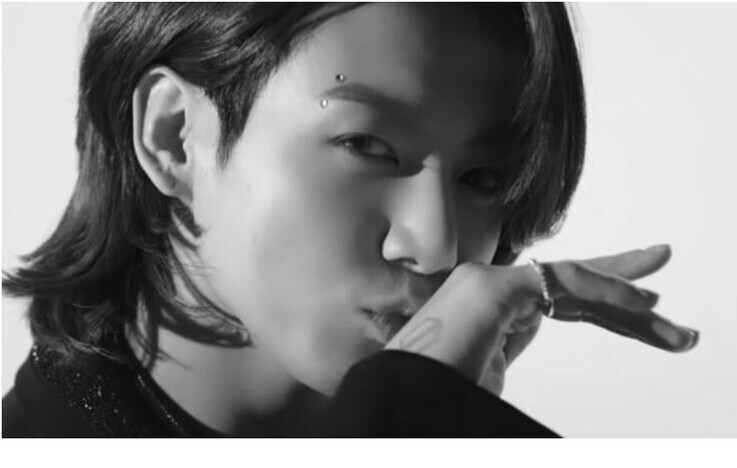hankyoreh
Links to other country sites 다른 나라 사이트 링크
What is the “BTS dilemma”?

Last week, I began a special summer feature that takes another look at BTS. The first installment was an analysis of the group’s new song “Butter,” and it arrived at the conclusion that the reason so many people hear similarities between that song and the previous song “Dynamite” — despite them having little in common apart from Michael Jackson references — has to do with what I called the “BTS dilemma.”
The BTS dilemmaThe members of BTS are global stars, racking up massive sales and boasting far more fans overseas than they do in Korea. Every new video attracts hundreds of thousands of comments — not just views, but comments — in various languages, and you have to scroll for a while to find one that’s written in Korean.
A characteristic of the group’s “Army,” or fan club, is its broad distribution across different nationalities, genders and ages. No other act has enjoyed this kind of popularity that transcends ethnicity, gender and age.
Yet this very strength shoulders them with a challenging task: it means the tastes that they have to satisfy are that much more diverse. It’s as though they have to draw something that is a rectangle, a triangle and a circle all at once. It’s not easy.
I see this conundrum as having started roughly around the time the group released their song “Boy With Luv.” Up until then, BTS could pretty much make whatever music they wanted, and they were able to carry on with the same kind of individuality that had been building since the beginning.
But once the US pop market became the focus of their activities, this approach had to change. They needed “universal” songs that satisfied fans of various stripes while still hewing to the mainstream.
This called for songs that were “lovable,” without any edge to them. That’s the context that “Boy With Luv” emerged from, and “Dynamite” and “Butter” were continuations from there.
Consider it in songwriting terms.
From the beginning, BTS songs were written chiefly by Big Hit producer Pdogg, with the group’s members actively taking part. Even when foreign songwriters joined in occasionally, it was usually only one or two.
But by the time of “Boy With Luv,” foreign production teams had taken center stage. With “Dynamite,” the first BTS song to top the Billboard Hot 100, no Big Hit producers or group members are listed in the songwriting credits.

One of the songwriters for “Dynamite,” David Stewart, said they strived to write lyrics with only simple English words commonly used around the world. In other words, they made sure not to include expressions that are only used in the UK or vocabulary exclusive to specific generations in the US. That’s what I meant earlier by “universal.”
The same is true for the latest song, “Butter.” Apart from group leader RM, it was penned by unfamiliar foreign songwriters.
Once again, the lyrics use words and expressions that are easily recognizable to different nationalities and generations, with a rhythm and melody familiar to pop music fans.
The rap part, in contrast, was kept to a minimum. As recently as “Boy With Luv,” the rapping members — RM, Suga and J-Hope — had been allotted eight bars; by “Dynamite” and “Butter,” their share was down to four.
Their famously difficult choreography has also been visibly simplified. Examples include the kicks from “Boy With Luv,” the disco from “Dynamite,” and now the “hand kiss” from “Butter.”
I find myself thinking it’s the sort of thing even I could do. That may explain the explosion in “cover dance” videos on YouTube.
It’s because of these similarities that “Butter” and “Dynamite” are seen as similar, despite being completely different songs.
But why the hand-kissing, of all things? A kiss takes on a different meaning depending on what part of the body your lips touch; a kiss on the hand means “I respect you.” If that’s the case, the choreography is a failure — it’s against the rules to make respect look that sexy.
These days, BTS has been topping the Billboard charts repeatedly with cloying pop music, but they are not the type of group to content themselves with this sort of popular success. Would a chef who can make any dish in the world be content with preparing only the top-selling item on the menu?
The hardcore Army members are similarly longing to hear the kind of distinctive songs only BTS can produce. This is where the BTS dilemma lies.
After wrestling with the problem, they’ve settled on a mission impossible strategy of achieving the best of both worlds: satisfying mainstream tastes as well as those of their existing fans. So when they release a new album, the lead single is something thoroughly geared to popular tastes, while the other songs show what makes BTS unique.
This is to say nothing of the solo songs by the group’s members. It’s a way for the Army members who miss the “old BTS” to rest easy and satisfy their hankering.
Going a step farther, they’ve also led off with songs sung entirely in Korean. “ON” — with the music, rapping and choreography all pushed to extremes — and “Life Goes On,” a quieter number that represents its polar opposite, have taken center stage ahead of sleek pop numbers like “Dynamite” and “Butter.”
It takes astounding confidence for an act at the summit of pop music to make these kinds of choices. It’s certainly an achievement when “Butter” tops the Billboard Hot 100, but it’s all the more surprising when “Life Goes On” does the same thing, with its Korean lyrics and “gayo” (traditional Korean pop) style.
Recently, BTS has alternated between English-language songs targeting the US pop market and Korean-language songs that fully reflect the group’s original character. “Butter” belongs to the first category, so what will the follow-up look like?
I’d predict something in the hip hop genre with a bit of Korean sprinkled in. This may be more of a hope than a prediction.
I supposed that after the “butter” of this summer, we’ll find out whether this column is on the mark or totally off base. In the next one, I’ll examine how each of the group’s members has transformed.
By Lee Jae-ik, radio producer at SBS
Please direct comments or questions to [english@hani.co.kr]

Editorial・opinion
![[Editorial] Penalties for airing allegations against Korea’s first lady endanger free press [Editorial] Penalties for airing allegations against Korea’s first lady endanger free press](https://flexible.img.hani.co.kr/flexible/normal/500/300/imgdb/original/2024/0502/1817146398095106.jpg) [Editorial] Penalties for airing allegations against Korea’s first lady endanger free press
[Editorial] Penalties for airing allegations against Korea’s first lady endanger free press![[Editorial] Yoon must halt procurement of SM-3 interceptor missiles [Editorial] Yoon must halt procurement of SM-3 interceptor missiles](https://flexible.img.hani.co.kr/flexible/normal/500/300/imgdb/child/2024/0501/17145495551605_1717145495195344.jpg) [Editorial] Yoon must halt procurement of SM-3 interceptor missiles
[Editorial] Yoon must halt procurement of SM-3 interceptor missiles- [Guest essay] Maybe Korea’s rapid population decline is an opportunity, not a crisis
- [Column] Can Yoon steer diplomacy with Russia, China back on track?
- [Column] Season 2 of special prosecutor probe may be coming to Korea soon
- [Column] Park Geun-hye déjà vu in Yoon Suk-yeol
- [Editorial] New weight of N. Korea’s nuclear threats makes dialogue all the more urgent
- [Guest essay] The real reason Korea’s new right wants to dub Rhee a founding father
- [Column] ‘Choson’: Is it time we start referring to N. Korea in its own terms?
- [Editorial] Japan’s rewriting of history with Korea has gone too far
Most viewed articles
- 1In rejecting statute of limitations defense in massacre case, Korean court faces up to Vietnam War a
- 2Historic court ruling recognizes Korean state culpability for massacre in Vietnam
- 3“Those souls can rest now”: Vietnam massacre survivor reacts to Korean court win
- 41 in 3 S. Korean security experts support nuclear armament, CSIS finds
- 5[Editorial] Verdict on Korea’s massacre in Vietnam a first step in atonement
- 6Months and months of overdue wages are pushing migrant workers in Korea into debt
- 7Bills for Itaewon crush inquiry, special counsel probe into Marine’s death pass National Assembly
- 8Ruling on Korean atrocity in Vietnam comes 23 years after Hankyoreh 21’s exposé
- 9[Interview] Continuing the fight for victims of civilian massacres during Vietnam War
- 10Korea’s atrocities in Vietnam, in the words of those who saw and survived them